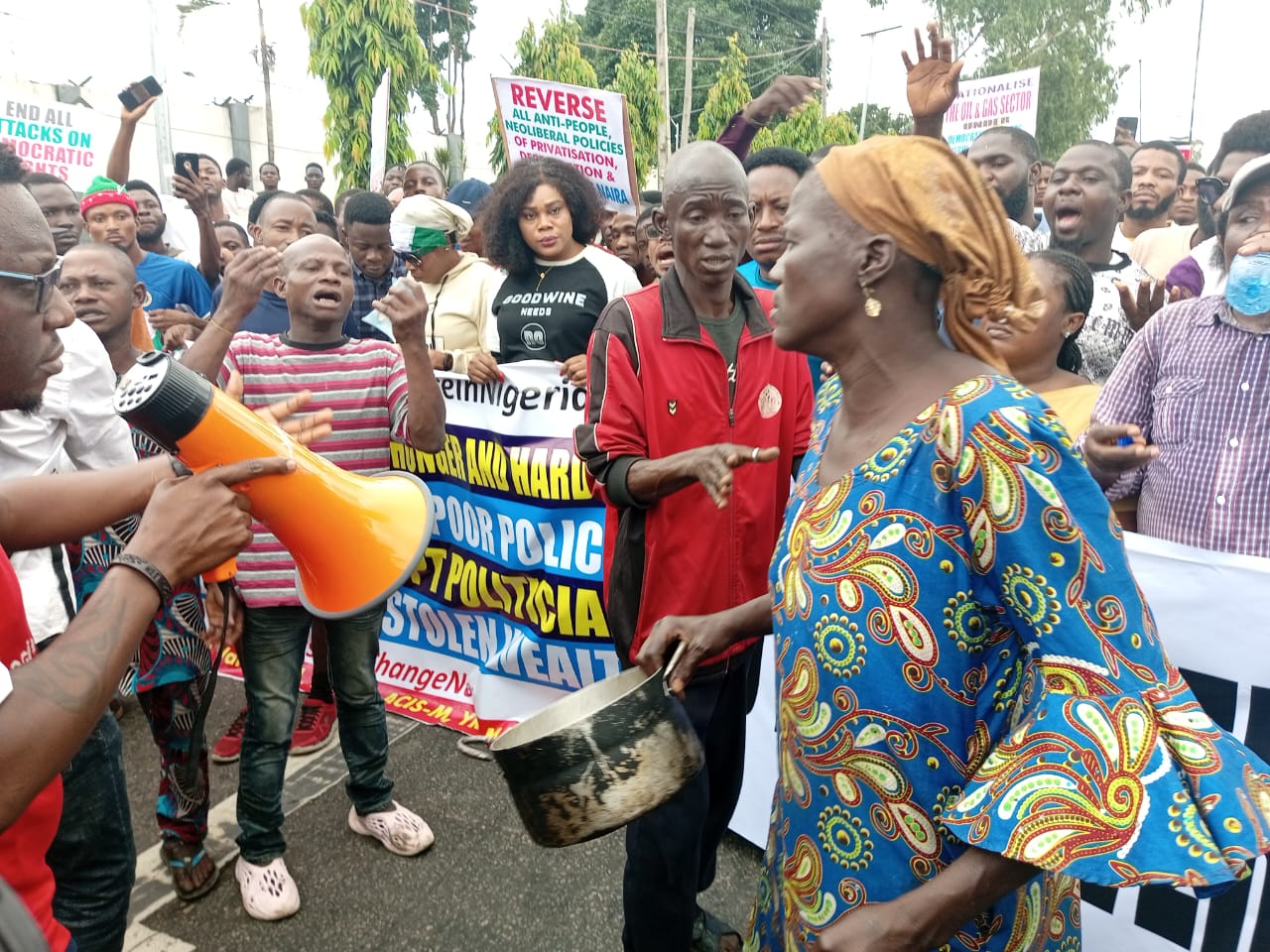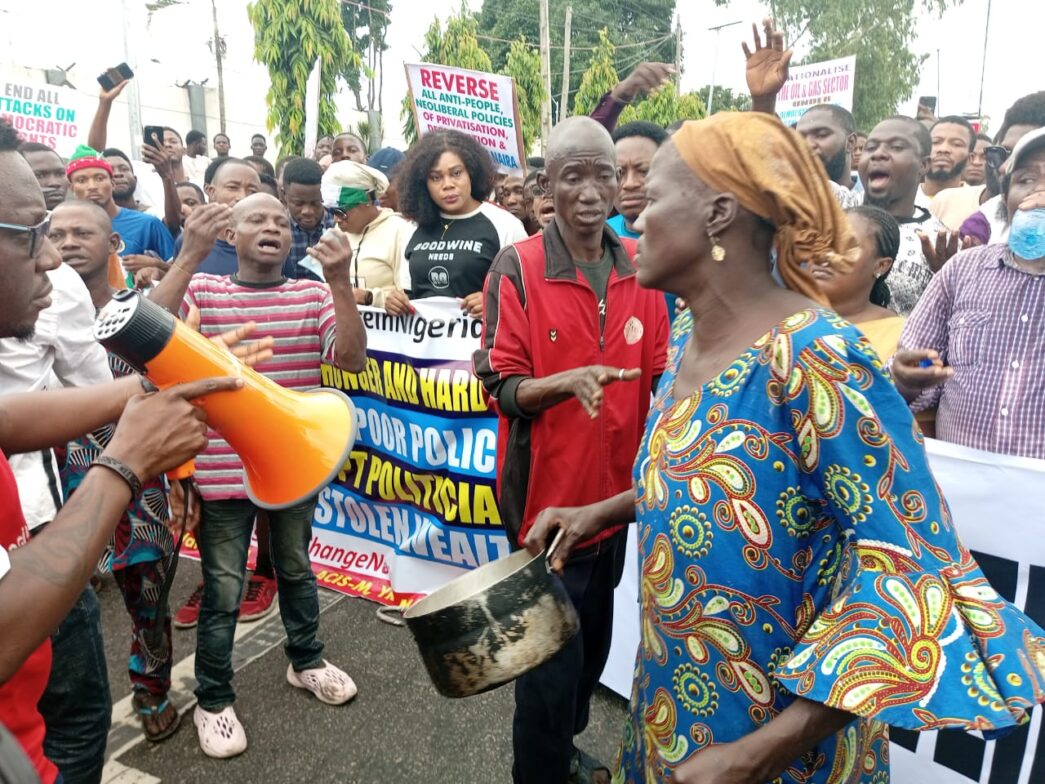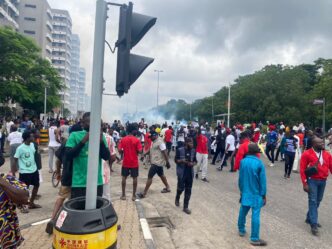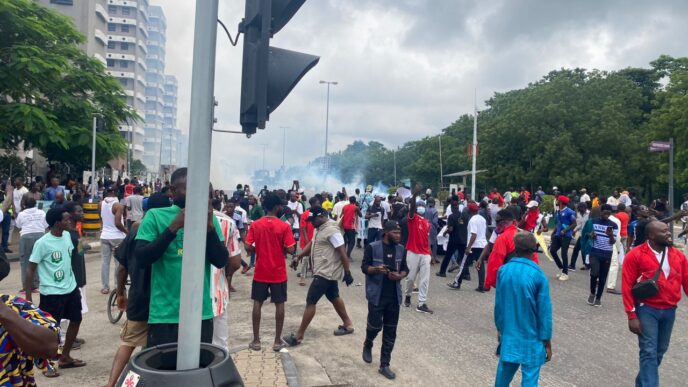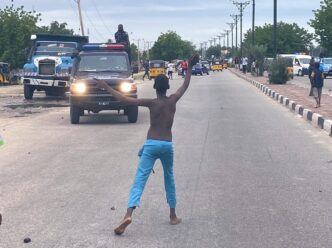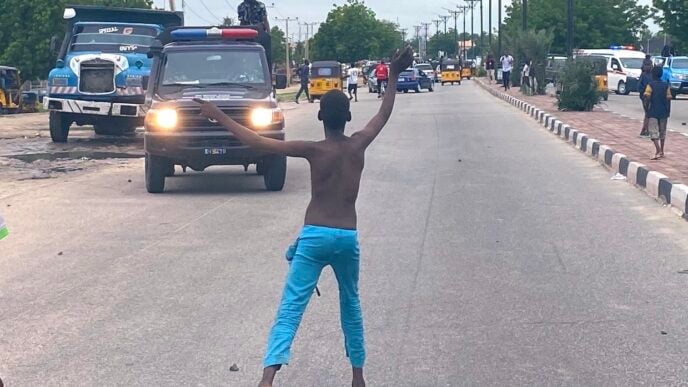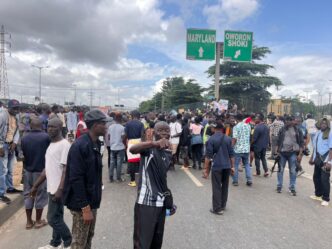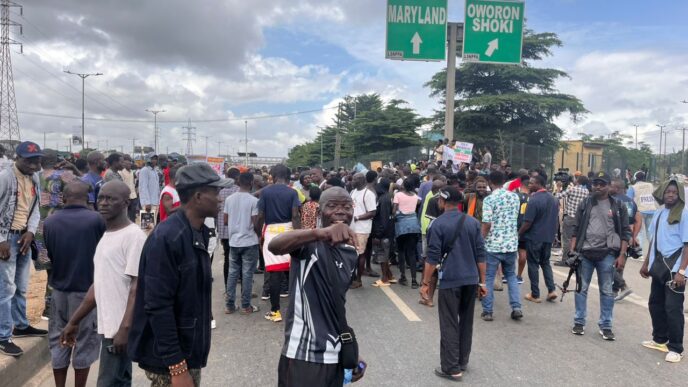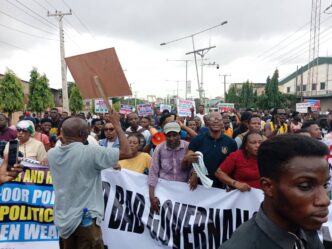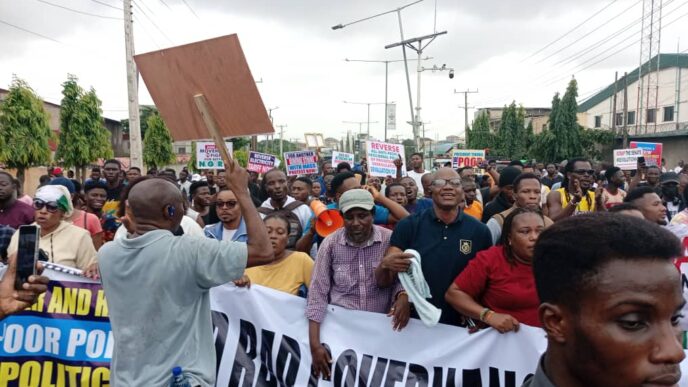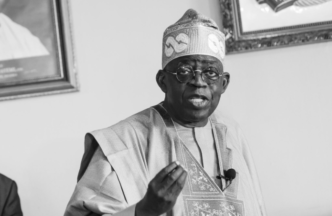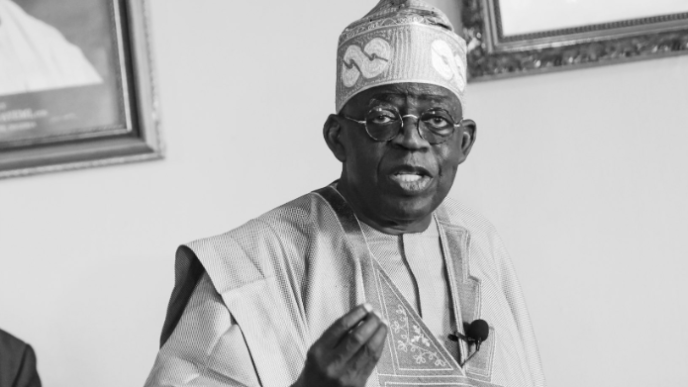There you have it. The “hunger protest” that took off in most parts of the country on Wednesday has predictably led to burning, looting and killing. In one instance, demonstrators tried to overrun a government house. A man was seen vandalising traffic lights to — wait for this — “end bad governance”. Unfortunately, at least a dozen deaths have been reported. The police are now saying if they are overwhelmed, the military will have to come in. Anybody who is familiar with the history of military involvement in civil conflicts will not be excited by such prospects. I am already fidgeting because it never ends well. But this begs the question: don’t the people have a right to protest?
Sure, they do. As I argued in my previous article, it is a democratic right. It is constitutionally guaranteed. But, as I also warned, political hijack is inevitable. It is quite predictable. Nigeria is so polarised at the moment that virtually anything is prone to political hijack. There are people still smarting from the 2023 general election, there are people hurting over the pattern of political appointments, and there are people angered by the Nigerian condition. So, when those hit by economic hardship take to the streets, it offers an unlimited opportunity for all kinds of interests to align and stoke the fire of unrest. We are stuck between genuine activism and crass opportunism.
Public protests involving Kano and Lagos, Nigeria’s most populated states, will always be challenging because of their sizeable colonies of street urchins. So far, Lagos has been peaceful but nobody can guarantee that for long. It takes just one group of area boys to kickstart mayhem. Kano ruffians went gaga from day one, as if they had been waiting for the protest all along. They invaded the government house. They vandalised the newly built Nigerian Communication Commission (NCC) industrial park, looting desktop computers. They also looted shops and warehouses in several parts of the state. During a similar protest in January 2012, the government house was also attacked.
Indeed, ironies never end. Just before President Bola Ahmed Tinubu was inaugurated in May 2023, I read an article in a foreign magazine questioning his ability to carry out the “much-needed” economic reforms because of a possible public backlash. Most voters did not choose him (he got only 37 percent), the author reasoned, and even that margin was controversial as the outcome was facing a legal challenge by his two major opponents. In order to warm himself into the hearts of Nigerians, Tinubu would find it near impossible to remove the petrol subsidy and liberalise the FX markets because of the ripple effects and backlash, the author argued. Well, Tinubu surprised them.
Advertisement
The removal of petrol subsidy led to a spike in transportation costs, but things were still somehow manageable. While petrol price tripled, transport costs did not. The upward adjustments of fares on most routes were less than 100 percent. Prices of goods were still within reasonable range. The real trouble started with the massive shift in the exchange rate — rising from N750/$ to nearly N2,000/$ at a point in the open market. For an import-dependent country, the impact was felt intensely everywhere: food, medicines, transportation, everything. Local foodstuffs are transported by diesel-powered trucks. The price of diesel, which is imported, doubled as a result of the naira crisis.
When it rains, it pours. Farming in the north was hampered by various factors: too much rain, which affected productivity; the recoloration of the naira, which had denied farmers access to cash to run their farms; and increased insecurity, which kept farmers away from their businesses. Tomatoes, so precious to the taste and integrity of many dishes and soups, were infected by a virus, thereby hampering harvest. Between June 2023 and June 2024, tomato prices soared by 320 percent. A kilo of local rice went from N608 to N1,702. Life-saving garri jumped from N403/kilo to N1,135. Food inflation was 40.87 percent in June 2024. These are National Bureau of Statistics (NBS) data.
This cost of living crisis is the worst in nearly 40 years. That it took Nigerians one year to hit the streets is something of a miracle. Maybe we do not have the culture of protesting against economic hardship. Maybe we are more driven by political and religious emotions — the things that divide us — than economic problems, which do not discriminate on the basis of ethnicity, religion, region or party and should unite us. Even the #EndSARS protests of 2020, originally intended to protest police brutality before it was extended to #EndBuhari and #EndNigeria, were more of a southern thing. It was when the looting started that it became a nationwide event, with rioters helping themselves.
Advertisement
As I often tell people in my circle, you can start a public protest peacefully but you cannot determine what happens thereafter. As an undergraduate of the University of Lagos during military rule, I witnessed these things. Although I was not an activist, I participated in demonstrations. I once saw how things got out of hand. While we were singing solidarity songs on our way from Akoka to Yaba, some ruffians suddenly joined in, uninvited, and started harassing and extorting motorists and shop owners. In those days, it wouldn’t take long for police to start firing teargas and bullets. They would blame protesters for “lynching pickpockets” — despite glaring bullet wounds on the dead bodies.
When this hunger protest was announced, I had only one fear: deaths. So far, fatalities have been limited to the north — where food is cheaper but non-food poverty rates are higher. In Borno state, insurgents reportedly infiltrated the crowd and killed four protesters with an explosive. Two people were reportedly killed in Niger state, where the protest started days earlier, while the federal capital territory (FCT), Jigawa and Kaduna states also recorded fatalities. Many deaths resulted from protests turning violent. From media reports, it would appear police have been using mostly teargas on protesters who operated outside the court-approved venues. We will discuss this another day.
Has the protest been successful? I would think it is too early to say. There are two dimensions to the protest, from what I can see. There is the dimension that is focused on the rising cost of living, which many have dubbed “hunger protest” and which can be partially addressed in the short run with emergency measures. The other dimension is on the need to end bad governance, which is a bit tricky and not going to be achieved quickly. I have also read a number of demands: that petrol price should be reduced to N200/litre, that the increase in electricity tariffs should be reversed, that education and healthcare should be free, and that legislators should only serve part-time.
One thing, though, is that the way government officials tried to stop the protest showed that they were finally coming to the realisation that there was fire on the mountain. They tried to put out the fire to avoid a conflagration. Tinubu held emergency meetings with leaders from various sectors and segments of the society. All the court injunctions sought and secured were pointers to the fact that they knew something could snap. As I argued previously, millions of Nigerians would not need any invitation to go on the streets. The conditions were ripe enough for a protest to grow organically. Tinubu’s efforts probably diluted the intensity of the protest but at least he finally got the memo.
Advertisement
The president can, in fairness, argue that the economy was going into a coma when he came on board and he needed to do these surgical operations to save it. I think many people will not counter that. My misgiving, which I have expressed again and again, is the way and manner the reform has been implemented as if Nigerians are not human beings. My anger is the obvious disconnect between the government and the people on the message of sacrifice. There is yet no evidence that this government is living the message of sacrifice. When you look at the budgetary priorities and the lifestyles of public officers, you can only conclude that Nigerians are being taken for granted.
There is one message I want our politicians, from top to bottom, to take away from the protest: that Nigerian lives matter. Our politicians seem to have learnt nothing from the End SARS mayhem which exposed their greed and endangered their safety. When ordinary Nigerians cannot afford garri but their leaders can rinse their mouths with champagne and be uttering gibberish to add insult to the injury, then you know they do not care about the anger of the people. They need to change their ways. I insist Nigerians are not a difficult people to please. All the leaders need to do is show that they care — in word and in action. If this protest can achieve that, I would count it as a huge success.
AND FOUR OTHER THINGS…
RIP ONYEKA ONWENU
Onyeka Onwenu died suddenly on Tuesday night after performing at the 80th birthday party of Dr Stella Okoli, founder of Emzor Pharmaceuticals. What a tragedy. The legendary singer, whose song ‘One Love’ is an all-time favourite of mine, was full of life throughout her performance but collapsed shortly after apparently suffering a heart attack. Efforts to revive her failed. She lived a full and fulfilled life as a singer, actor, broadcaster and gender activist. In the 1980s, Onwenu, the late Christy Essien-Igbokwe, Stella Monye and Funmi Davies deftly put Nigerian female singers on the front row with hits after hits. My sincere condolences to Onwenu’s sons and other loved ones. Painful.
Advertisement
MERCHANTS OF MALICE
Ethnic hate is not a strange thing in Nigeria. Social media platforms are readily available to amplify the hate speech. Cowards from different ethnic groups are constantly stoking the fire — particularly on the platform formerly known as Twitter. Recently, a handle, @LagosPedia, launched a hashtag, #IgboMustGo, to mobilise for the hounding of Igbos out of Lagos state and the entire south-west. It said a protest would hold from August 20 to 30 and asked Yorubas in the south-east to return home. I wouldn’t take this nonsense too seriously because I don’t see that happening, but I am worried at the increasing boldness of these preachers of hate and their enablers and supporters. Disgusting.
Advertisement
OUT OF FAVOUR
We have done it again. Favour Ofili, national women’s 100m champion, was — inexplicably — not registered for the sprint event at the 2024 Olympics. Initially, Ofili blamed the Nigeria Olympic Committee (NOC) and the Athletics Federation of Nigeria (AFN) for the unbelievable oversight. The AFN has since proved that it submitted Ofili’s name to the NOC. Mr John Enoh, minister of sports development, has promised “thorough sanctions” for those responsible for the embarrassment. I will not be surprised if it is one tiny clerical officer somewhere that will be sacrificed. In Nigeria, those who should take responsibility for failings never do and the beat goes on thereafter. Disastrous.
Advertisement
NO COMMENT
You can take your pick of the bizarre images from the cost of living protest across the federation. Is it the man who stole traffic lights? Where will he use them? As the saying goes, if you steal a king’s kakaki (trumpet), where are you going to blow it? Or is it the pro-government protester who hilariously started complaining about the price of garri after presumably pocketing the protest allowance of N5,000? His colleague had to quickly push him away in another “off your mic” moment. The trophy still goes to the woman with an empty pot, who was complaining about how the cost of living had pushed her to hunger. Under the pot, she was holding a sachet of alcohol. Wonderful.
Advertisement
Add a comment

